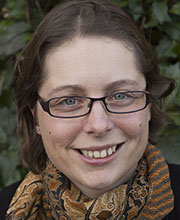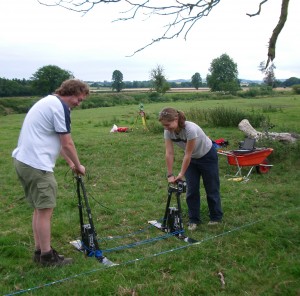I love being out in the field, rain or shine (or sleet or snow), as long as I’m not being chased by a horse or a cow (some terrifying experiences there). I spent several years working on the floodplain of the River Severn in Shropshire monitoring the water pathways over and through the floodplain sediments. The idea was to use this data for modelling the flooding processes and hyporheic exchange of waters during a flood event. However, instrumenting the floodplain was much more difficult than I had anticipated. I quickly realised that fieldwork was pretty hard and having someone with field experience on the team was the key to success, especially when it came to siting and wiring up equipment. However, even though our transects of tensiometers never worked (possibly because members of the team had played with them as lightsabers) and the cows destroyed one of the main enclosures only minutes after we’d finished building it, we did get some useful data on water pathways in the floodplain and more importantly I had an awful lot of fun in the field. There is something about fresh air and/or beating rain and/or knee deep mud that truly warms the soul. I also spent hours watching the eddies spinning off of some of the best meanders in the country.
As an environmental modeller fieldwork also plays another function, one of ‘keeping it real’ and I heartily recommend a bit of fieldwork to all modellers out there. The immense complexity of floodplain sediments can only be really appreciated by getting your hands dirty taking soil cores, subsurface radar profiles and most importantly eating your sandwiches under a tree watching the way the microtopography and the vegetation influences the surface runoff in the pouring rain.
In the last few years since my children arrived I’ve had less opportunity to go off on a fieldwork ‘jolly’, as the responsibilities of childcare pickups, even perfectly juggled with my husband, do not lend themselves to any long days that aren’t top priority. Research fieldtrips are so easily crowded out by conferences, workshops and other meetings, which are usually in windowless conference rooms. I do miss those eddies and slinging on my wellies.
A bit about today’s blogger:
 Hannah Cloke is a hydrologist and physical geographer specializing in land surface modelling, flood forecasting and catchment hydrology. She works closely with the Environment Agency, the Met Office, the Flood Forecasting Centre and the European Centre for Medium-Range Weather Forecasts as well as a wide range of other national and international partners. She advised government on the Jan/Feb 2014 floods crisis and provided substantial expert commentary in the media.
Hannah Cloke is a hydrologist and physical geographer specializing in land surface modelling, flood forecasting and catchment hydrology. She works closely with the Environment Agency, the Met Office, the Flood Forecasting Centre and the European Centre for Medium-Range Weather Forecasts as well as a wide range of other national and international partners. She advised government on the Jan/Feb 2014 floods crisis and provided substantial expert commentary in the media.
Hannah obtained a BSc (1999) and PhD (2003) in Geography from the University of Bristol. She then worked as a Research Associate at the European Commission Joint Research Centre in Ispra, Italy, working on the European Flood Alert System and then from 2004 lectured at in the Department of Geography at King’s College London. In 2012 she moved to the University of Reading; to a joint post between the Department of Geography and Environmental Science and the Department of Meteorology, where she is now Professor of Hydrology and Director Hydrology@Reading
Hannah is currently a member of the of the Environment Agency-DEFRA R&D flood science programme advisory group. She is a member of the NERC Peer Review Panel C, Floods theme coordinator for the International Hydrological Programme (IHP): FRIEND network, and a committee member of the EGU Hydrology section: Catchment hydrology. She is on the editorial board of the journals Meteorological Applications and Hydrology and Earth System Sciences and is guest editor for Hydrological Processes.
Hannah is an active member of the HEPEX project and recently served on the British Hydrological Society committee.



